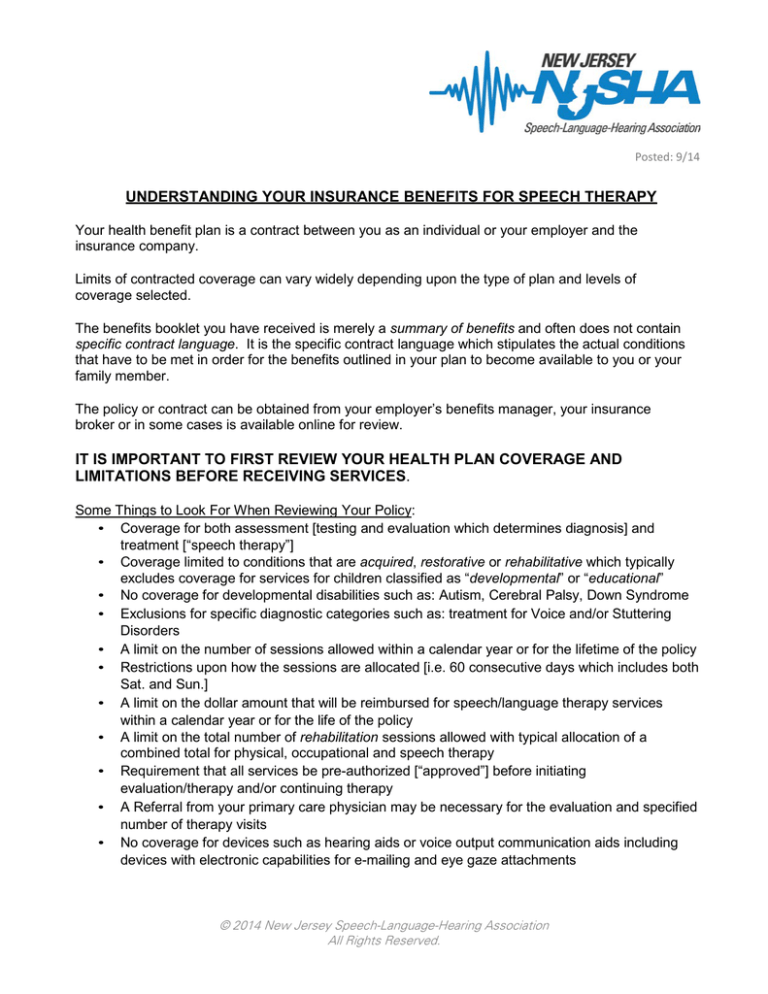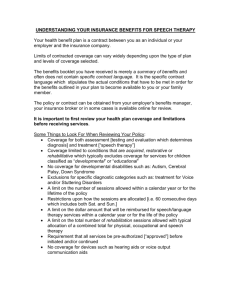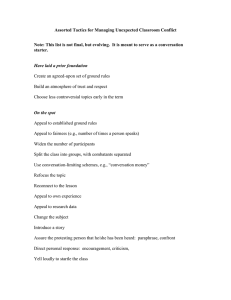
Posted: 9/14
UNDERSTANDING YOUR INSURANCE BENEFITS FOR SPEECH THERAPY
Your health benefit plan is a contract between you as an individual or your employer and the
insurance company.
Limits of contracted coverage can vary widely depending upon the type of plan and levels of
coverage selected.
The benefits booklet you have received is merely a summary of benefits and often does not contain
specific contract language. It is the specific contract language which stipulates the actual conditions
that have to be met in order for the benefits outlined in your plan to become available to you or your
family member.
The policy or contract can be obtained from your employer’s benefits manager, your insurance
broker or in some cases is available online for review.
IT IS IMPORTANT TO FIRST REVIEW YOUR HEALTH PLAN COVERAGE AND
LIMITATIONS BEFORE RECEIVING SERVICES.
Some Things to Look For When Reviewing Your Policy:
• Coverage for both assessment [testing and evaluation which determines diagnosis] and
treatment [“speech therapy”]
• Coverage limited to conditions that are acquired, restorative or rehabilitative which typically
excludes coverage for services for children classified as “developmental” or “educational”
• No coverage for developmental disabilities such as: Autism, Cerebral Palsy, Down Syndrome
• Exclusions for specific diagnostic categories such as: treatment for Voice and/or Stuttering
Disorders
• A limit on the number of sessions allowed within a calendar year or for the lifetime of the policy
• Restrictions upon how the sessions are allocated [i.e. 60 consecutive days which includes both
Sat. and Sun.]
• A limit on the dollar amount that will be reimbursed for speech/language therapy services
within a calendar year or for the life of the policy
• A limit on the total number of rehabilitation sessions allowed with typical allocation of a
combined total for physical, occupational and speech therapy
• Requirement that all services be pre-authorized [“approved”] before initiating
evaluation/therapy and/or continuing therapy
• A Referral from your primary care physician may be necessary for the evaluation and specified
number of therapy visits
• No coverage for devices such as hearing aids or voice output communication aids including
devices with electronic capabilities for e-mailing and eye gaze attachments
© 2014 New Jersey Speech-Language-Hearing Association
All Rights Reserved.
Posted: 9/14
WHAT TO DO If YOUR POLICY APPEARS TO EXCLUDE NECESSARY SPEECHLANGUAGE EVALUATION AND TREATMENT SERVICES OR YOU HAVE RECEIVED A
DENIAL AFTER FILING A CLAIM
It is important to contact your employer because:
1. Employers have the greatest influence in obtaining better insurance coverage as they
negotiate the contracts with your insurance carrier. Your Human Resource Director or
Benefits Manager may not recognize the limitations of the policy as purchased unless you
inform them. Group insurance coverage for comprehensive speech-language evaluation and
treatment is typically a relatively inexpensive rider for most companies to add to existing
polices.
2. Employers may be able to intervene with the insurance carrier on your behalf. The employer
as the purchaser of the health insurance policy has a relationship with the carrier as its
customer. Ask your Human Resource Director or Benefits Manager to contact the insurance
carrier on your behalf to support your appeal.
APPEALING AN INSURANCE DENIAL
All denials that are received in written form include directions for filing an appeal. If the denial is
received over the telephone or is anticipated due to contract language, contact your insurer directly
to verify your health plan’s process for filing an appeal.
Most insurance carriers in the state of New Jersey include two levels for internal [inside the insurance
company] appeal.
Filing an appeal requires that you gather documentation to support your case including but not
limited to:
• written documentation from a licensed and certified Speech-Language Pathologist that
supports the need for treatment and proposed treatment goals
• statements from the primary care physician and additional appropriate medical consultants
supporting the medical necessity and efficacy of the proposed treatment and citing the
negative impact upon health and functioning in the absence of treatment
• your own appeal letter that directly addresses and refutes the basis for the denial
• if the claim is being denied as Not A Covered Benefit include actual contract language
that supports your claim
• if the claim is being denied as Not Medically Necessary explain why the service is a
recognized treatment for your condition, is being performed for a medical reason, is usual and
customary for your condition and is ordered by your physician. Articles from professional
journals or presidents set by previous appeals can often be found online and included to
support your claims.
© 2014 New Jersey Speech-Language-Hearing Association
All Rights Reserved.
Posted: 9/14
HELPFUL TIPS WHEN COMMUNICATING WITH YOUR INSURANCE COMPANY
Always Write Down:
• WHO [you spoke with]
• WHAT [notes that summarize the content of the conversation]
• WHERE [at what number you can contact the same person again if possible]
• WHEN [time and date the conversation occurred]
Always ASK for a Reference Number before ending your conversation. In the future this will assist
an insurance company representative in finding the insurance company’s record of your previous
conversation and can be noted in correspondence as documentation of a verbal exchange.
If mailing material, send Certified Mail, Return Receipt Requested wherever possible.
Always request to Fax materials whenever possible to expedite the Appeals Process.
WHAT IS YOUR NEXT STEP IF BOTH LEVELS OF INTERNAL APPEAL ARE
EXHAUSTED
If the original denial is upheld through both First and Second level internal appeal, you are allowed
to file for an External Appeal with the Dept. of Banking and Insurance.
The Office of Managed Care in the Dept. of Health and Senior Services monitors the compliance of
managed care plans with New Jersey rules and legislation. This office oversees the Independent
Health Care Appeals Program. A request for an Independent Health Care Review must be filed with
the state within 60 days after receiving the second level appeal denial from your insurance carrier.
Your case will be reviewed by independent experts under contract to the state. The panel will only
review any previous documentation submitted to support your claim and you will not be able to add
any additional documentation at this time.
There is a nominal application fee. Most decisions rendered by the Independent Health Care Appeals
Program are honored by individual insurance carriers.
For more information about filing for an Independent Appeal you may go online at
www.state.nj.us/health or call the Managed Care Office Toll-Free at 888-393-1062.
© 2014 New Jersey Speech-Language-Hearing Association
All Rights Reserved.



